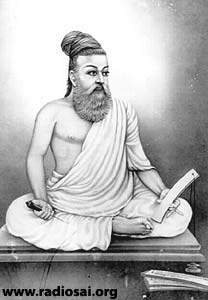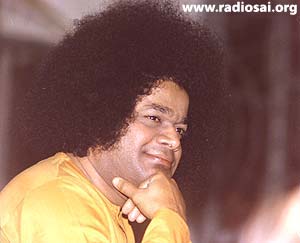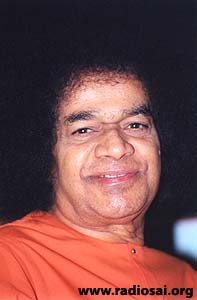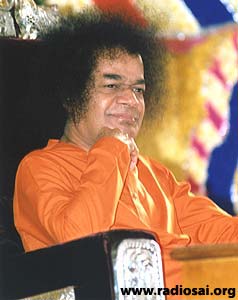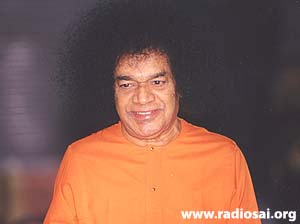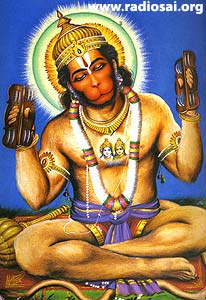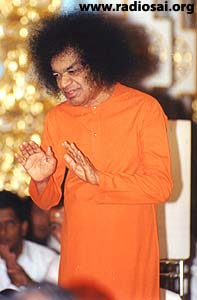 |
 |
 |
Volume
6 - Issue 04
APRIL - 2008 |
CONVERSATIONS WITH SAI Satyopanishad - part 3:
CHAPTER 1 - THE INDIA ETERNAL Anil Kumar (AK): Swami! Right now, we are in Kodai Kanal. Tamilnadu is known for its renowned devotees. We often hear about Manikya Vachakar and Tiruvalluvar. We want to hear from You about these two illustrious sons of Tamilnadu.
Bhagavan: Manikya Vachakar is the personification of forbearance, forgiveness, patience, and devotion. One day, the son of a very rich man came to him. You know, Manikya Vachakar was selling saris and maintaining his family. This boy, who came to him, was a pampered and spoilt child. Picking up a sari there, the boy asked, "What is the price of this sari?" Manikya Vachakar said, "Twenty rupees, Sir". The boy tore the sari into two halves and said, "What is the price of this half sari?" The sari seller said, "Rupees ten, Sir". The boy tore it further into two halves and asked, "Now, what is the price of this quarter sari"? The former patiently replied, "Rupees five, Sir". The mischievous boy was very much taken aback by Manikya Vachakar's patience. He then asked, "How is it that you are so patient in spite of my mischief?" Manikya Vachakar smiled and said, "I am a devotee of God and I have full faith in Him. He is responsible for my peace and calmness." In Tamilnadu, there was one devotee by name Tiruvalluvar. He was highly reputed and is known even today for his devotional composition, Tirukkural. In those days, the Pandya king had youngsters serving him as ministers. Tiruvalluvar was one of them. The Pandya king had a great liking for horses. He liked to have a number of horses of different breeds from all parts of the country. He called Tiruvalluvar, gave him some money, and sent him to get new breeds of horses from all places. The latter agreed and proceeded. On his way, Tiruvalluvar found a temple in a dilapidated condition. He decided to renovate it, and in doing so, he spent all the money he had with him. Having come to know of what he had done, the King became furious. He kept Tiruvalluvar behind bars as a punishment. There, in the prison, Tiruvalluvar composed his famous Tirukkural. The King repented later for his hasty and wrong decision. He requested Tiruvalluvar to return and resume his duties as a minister. However, Tiruvalluvar politely refused to take up any responsibilities in the kingdom. He spent the remaining part of his life wholly in spiritual pursuits. AK: Swami! God is attributeless. He is above the three qualities - sattvika, rajasika, and tamasika. But, we are bound by these three attributes. Then, how can we realise God?
Bhagavan: The Divine has two aspects - He can be experienced as the one with attributes, and also as beyond them. You should know one thing chiefly - God is in the attributes. But, the attributes are not in Him. Attributes or traits cannot function and operate without Divinity in them. Gold is in the jewellery; but, jewels are not in gold. Pots are made of clay, but not vice versa. Silverware, like a glass or a plate, is made of silver. But, the glass and plate are not in silver. Another example: You know, an electric bulb illumines, and a fan revolves. Radios, TVs, etc. are electrical gadgets, which need electricity for their functioning. But, none of these gadgets are there in electricity. Likewise, God is present in the attributes. They are not present in God. So, in a way, we can say that He has attributes, and at the same time, He is attributeless – that is, saguna and nirguna. Every man has three qualities - sattva, rajas, and tamas. But, the one that dominates the other two decides his/her thinking, feeling and action. But, unless we transcend these three qualities, we cannot experience Divinity in the true sense. Here is an example: If you want to see your own chest, what should you do? First, remove your coat, then your shirt, and finally even your undershirt, isn't it? So also, to see the chest of Divinity, you should first remove the coat of tamasika quality, the shirt of rajasika quality and the undershirt of sattvika quality. AK: Swami! We pray to you to tell us about the two aspects of God, with form and without it? Bhagavan: It is here that many are confused. Without a form, from where do you get the formless? How is it possible for you to visualise the Formless? Since you have a form, you can only think of God with a form. For example, if a fish is to think of God, it can visualise God only in the form of a bigger fish. So also, if at all a buffalo thinks of God, it can think of God only as a bigger buffalo. In the same way, man can think of God only as existing in human form, the form of an ideal man. Even the formless aspect of God can be meditated upon basing on the aspect of God with form. You cannot derive the formless without a form. Here is a small example. You are all seated in this hall, in front of Swami today, in Kodai Kanal, and listening to Swami's words. This is an experience with a form. Later, you go home, and after a few days, you begin to reflect on what had happened here. You recall the entire scenario. In fact, has Swami come to your place physically? Would you find this room at your place? Have all of you gone there? No. But this direct experience is pictured mentally, which gives you the indirect experience of being here. What you see here is the sakara (with form), and what you experience there is the nirakara (formless). So, the formless is based on the aspect with form. One cannot exist without the other. Another example. Here is milk. You want to drink it. How do you drink? Don't you need a cup or a glass? Similarly, to worship God (milk) you need a form (cup). AK: Swami, of these two ways of worship, the aspect with form, and the other, the formless, which is greater?
Bhagavan: In my opinion, both are equal. One is not in any way greater than the other. Now you are in Coimbatore. Here the land is plain, without any ups and downs. The level of the land is the same throughout; nobody leveled it. Nobody prepared the ground to be like this. It is basically the design of Coimbatore. But Kodai Kanal is located on the hills. Nobody assembled hills there. It is made that way. Coimbatore and Kodaikanal are different from one other. Each one is full, but in its own way. So also, the two methods of worship, one with form and the other formless, are equally beneficial to the seekers of truth and aspirants of spiritual enlightenment. AK: Swami! Scriptures declare that God is omnipresent; God is everywhere. Kindly explain this aspect of Divinity? How are we to understand this? Bhagavan: The Bhagavad Gita says, bijam mam sarva bhutanam, which means ‘God is the seed of this entire Creation, of all beings’. For example, you see here a mango seed. You sow it in the ground. The seed, as days pass, germinates. In the process, the seed produces a root, then a stem, a leaf, branches, and flowers gradually. The seed is latent in every part of the plant, as all parts directly or indirectly emerge from it. Finally, in the hard seed of the fruit, also the initial or the original seed is present. So, God is present in the entire Universe. The whole world is a tree, God is the seed, and fruits are the beings or creatures born of the tree of the world. AK: Swami! When the same Divinity is present in everyone, why should differences exist? Divinity being the same, why are we so different from each other?
Bhagavan: Ekam eva Advitiyam Brahma: ‘God is one without a second’, says the scripture. Then, how do we account for the variety, diversity, differences, and so on? A small example to understand this. Power supply being the same, don't you find the difference in the voltage of the bulbs that illumine? A bulb with a low voltage gives you light of low intensity, and a bulb with a high voltage illumines more brightly. Don't they? But, at the same time, electricity is one and the same. Bulbs are different in their voltage, and this determines the intensity of light. Similarly, our bodies are like those bulbs with the inner current of the same Divinity. AK: Swami! You said that Divinity is in everyone. Then, before we were born where had it been? Does Divinity exist even after our death? Bhagavan: The Divine exists. Divinity is imperishable, pure and unsullied. It has neither birth nor death. It is eternal and stable. It is beyond time and space. Divinity transcends all physical laws. Now, your question is: where did Divinity exist prior to your birth, and where will it be after your death, while it is in you during this lifetime? You see, there is an electrical wire on the wall, and also holders here and there to which bulbs are fixed. You get light only if a bulb is fixed to a holder and not otherwise. Why? The current passes through the wire that enters the bulb fixed to the holder. If you hold the bulb in your hand, it does not illumine, as there is no power supply. What you have to understand is this. The current has not been newly produced to get into the bulb. It was already there in the wire. If you remove the bulb, what will happen to the current? It will be there in the wire only. The only difference is that you will not experience its presence as illumination. Similarly, the bulb is the body, the current of Divinity flows into it as the illumination of life. When this bulb of the body is removed, even then, the current of Divinity persists hidden or latent, so much so that Divinity has all along been there before you were born, during your lifetime, and will even be there after your death like the current of electricity. AK: Swami! It is said that God is hrudayavasi, dweller in our heart. Is it the same heart, which is on the left side on our chest? Bhagavan: No, no. That is the physical heart. But the seat of God is the spiritual heart, which is also called hrudaya. It means hr + daya = hrudaya which means, the one filled with compassion. Today compassion is a matter of fashion. People put on kasayavastra (ochre robes), but they have kasayihrdaya (hearts of butchery). The physical heart is on the left side, while the spiritual heart is on the right side. The spiritual heart is the temple of God. In the Gita, Lord Krishna says, isvarah hruddese arjuna tisthati which means ‘God resides in the altar of your heart’. Knowledge, be it physical, secular, scientific or technological, relates to the head and not to the heart. But love, compassion, truth, sacrifice and forbearance concern the heart. AK: Swami! Can Divinity be probed into? Is it possible to know it by reasoning?
Bhagavan: All worldly experiences are bound by time and space. Your senses help you to experience all that is in the outer world. Science and Technology investigate the five elements, make certain combinations and permutations, and provide certain additional conveniences and comforts for mankind to lead a better life. These include electronic gadgets, computers, and so on. A scientist conducts an experiment, but a spiritual aspirant's experiences of Divinity cannot be conducted in a laboratory. How do you expect to convey anything about Divinity, which is beyond expression? How do you imagine Divinity, which is beyond comprehension? How do you investigate and experiment upon Divinity which transcends all your reasoning and senses? Science is based on experiments, and religion on experience. In science, you analyse; but in religion, you realise. AK: Swami! What should we do to receive God's Grace? Bhagavan: There is no way other than devotion. Your wealth, scholarship, authority and physical personality cannot please God. It is only your devotion that He looks into. Don't you know Guha in the Ramayana? What scholarship had he to please Rama? Nothing. He was not even educated. You also must have heard of Sabari, an ardent devotee of Lord Rama. How rich was she to be close to Rama? Nothing. She was in rags at that time, the poorest of the poor. What made the bird, Jatayu, receive the special blessings of Rama so as to deserve performance of the last rites at the Divine Hands of Rama?
Even Rama's father, Dasaratha, was not as fortunate as this bird Jatayu, because he died when Rama was in the forest, far away from Ayodhya. How about Hanuman, a monkey? By implicit faith in and total surrender to Rama he could be successful not only in the task assigned to him, but also came to be worshipped by the devotees of the Lord, and his worship has been continuing since the days of the Ramavatara. The Mahabharata clearly portrays Draupadi, the queen of the Pandavas, as Lord Krishna's devotee of the highest order, always, in times of success or failure, pleasure or pain, calm or turmoil, anywhere, either on the throne in Hastinapura, or in the forest. The Pandavas are known for their deep devotion and abounding love for Krishna. They are the best examples of equanimity and total surrender to God such that Krishna identified Himself completely with them by saying that Dharmaja (Yudhisthira) was His head, Arjuna His heart, Bhima His shoulders, and the two youngest brothers, Nakula and Sahadeva, equal to His two feet. This is true devotion. This is the ideal stature of a devotee. In the Bhagavata, you come across the Gopis (the cowherd girls who were rustic, innocent, and unlettered) whose madhura bhakti, total attachment to God, was backed by unconditional love and surrender. Their devotion was noble, pure, nectarine, and exemplary. They saw Krishna in bushes, thorns, leaves, branches, and flowers. Is theirs not tadatmyabhava, total identification? Isn't theirs the advaitabhava, non-dualistic state? They could not bear the pangs of separation from Krishna, even for a split second. This is the level of their devotion. Have you not heard about Tyagaraja, the South Indian saint-singer and composer, who had put the question: nidhi cala sukhama? ramuni sannidhi seva sukhama? Is it wealth that gives you happiness or proximity to God? Ramadas, Surdas, Kabir, Tulasidas, Jayadev, Tukaram, Mira, and others were the very personifications of devotion. They are remembered to this day. By reading about them, you will not only be the recipient of God's Grace, but even have a claim on God's Grace. You know, the moment you marry, your wife will have a claim on your property. This is due to the mangala sutra, the sacred knot tied at the time of the wedding. Similarly, devotion is bhakti sutra, the knot of devotion, which empowers the devotee to claim from God His Grace. Therefore, for everything, devotion is most important. For most people, it is the proper and noble approach to Divinity. AK: Swami! Why are we not the recipients of Divine Grace? Bhagavan: It is not proper to feel so. You are wrong if you think so. God's Grace is equally available to all of you. He makes no distinctions of caste, creed, sex, nationality, and so on. You should know that the defect is in you. You have to cleanse the tumbler of your heart. For example, it is raining heavily now. If you want to collect water in a vessel, what you do is to keep it straight. However, if you turn it downwards or put it upside down, is it possible to collect water? The downpour of rain will be of no help at all. Therefore, we have to keep our hearts always pure and ready to receive the rain of Grace. We have to turn it towards the rain of God's Love in order to collect it. Is it not so? AK: Swami! Our fortune is immeasurable, how many people get this opportunity! This is all Your Grace. But, how are we to preserve this? Bhagavan: Look! Out of the millions of devotees how many are able to be here? Is this proximity possible for everyone? Merit from several past lives had made you fortunate enough to be here. Out of a few thousand in our institutions, how many students are lucky enough to be here? Only a few of you could follow Me to this place, Kodai Kanal. This you will have to preserve and sustain carefully. A small example. Here is a roll of thread, which is the product of much rotating and winding. A time consuming job, really! If they take up this process in haste, and drop it in the middle out of neglect or carelessness, all the thread will lie scattered on the ground. Similarly, your fortune is like this roll of thread, carefully and laboriously wound, like the merit of the good deeds you had done in your past lives. If you neglect this fortune and lose it by any mischance, you can't get it back. All the effort you have put in will go waste. The thick pad at the centre of this roll is like your faith round which your meritorious deeds are wound. So, never neglect this good luck, nor take it for granted, nor view it as simple and ordinary. Negligence and carelessness are harmful to spiritual aspirants. AK: Swami! How does your Grace affect our destiny and our prarabdha, past karma?
Bhagavan: God's Grace and God's Will can change anything. God is Love. His Infinite Compassion makes Him change your prarabdha karma or the karmic effects of your past lives. A devotee can arrest God in the jail of his heart. In this world, there is nothing that you can't achieve with devotion. God's Grace can cancel all your karmic effects or the evil effects of your past life. Nothing untoward can happen to you. A small example. You see many medicines kept for sale in a medical shop. On each of the medicines you find the date of manufacture and of expiry. The medicine will not act with efficiency beyond the date of expiry. It becomes just useless. What God does is exactly the same thing. He simply stamps on the medicine bottle the date of expiry canceling your prarabdha karma, the suffering you are going through in this life. Right then, your suffering ends. This is how Swami, out of His sheer Grace and Compassion, gives you relief. AK: Swami! Can we be sure of God's Grace if we do sadhana regularly? Bhagavan: Certainly! As sure as anything! Why do you doubt? For example, you have a pet dog. You feed it every day, and you will notice that it will get habituated to come to you exactly at the same time every day to be fed. Is this not true? When regularity makes a dog respond, why not God? You will definitely receive His Grace. AK: Swami! We are here in Your presence because of Your Infinite Grace and Mercy. Your Blessings have brought us all here. We bask in the sunshine of bliss bestowed on us by Your Divine darshan, sparshan and sambhashan. Do we still need merit from past lives and the samskaras? Bhagavan: The present state of bliss and the merit from past lives are both essential and they should go together. They are closely interrelated. Take this example. Here the soil is sandy. When there are heavy rains, water sinks into the soil or gets absorbed in the soil. The same is the situation with you at present. Therefore, devotion doesn't remain steady. But, suppose there is a flow of river water, what happens when it rains? Water will flow with greater vigour than before. Similarly, your present blessed opportunity of being with Me is like rainwater. If you have good samskaras from your past life like the water flow of a river, the blissful state you are experiencing now will continue with more vigour. God's Grace is like a shower of rain. Your merit from the past will enable you to contain it. So, I tell you often to retain the good luck, the opportunity, and the privilege given to you. You draw water out of the well in a bucket. But you have to pick up the bucket full of water yourself. On the other hand, if you drop it in the middle, what happens? You can't collect water, can you? However, there is one important thing. If you love God intensely, you can achieve anything. As human effort increases, God's Grace also lends strength and intensity to the effort, which ultimately leads man to success. (To be continued...) – Heart2Heart Team
|
Vol 6 Issue 04 - APRIL 2008
|
Best viewed in Internet Explorer - 1024 x 768 resolution. |

